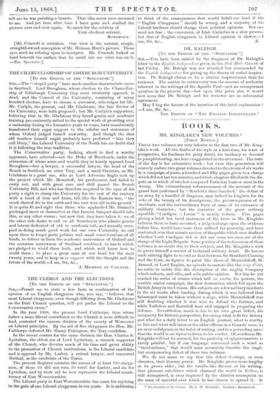THE CLERGY AND THE ELECTIONS.
[To THE EDITOR OF THE " SPECTATOR.1 SIR,—Permit me to state a few facts in confirmation of the opinion of an English clergyman who, you say, "believes that most Liberal clergymen, even though differing from Mr. Gladstone on the Irish Church question, will yet prefer the Liberal to the Conservative cause."
In the year 1858, the present Lord Calthorpe, than whose father a more liberal contributor to the Church it were difficult to find, contested the eastern division of the county of Worcester on Liberal principles. By the aid of five clergymen the Hon. Mr. Calthorpe defeated Mr. Slaney Pakington, the Tory candidate.
In the recent contest for the same division the Hon. Charles S. Lyttelton, the eldest son of Lord Lyttelton, a stauuch supporter of the Church, who devotes much of his time and great ability to the promotion of Church institutions, is the Liberal candidate and is opposed by Mr. Laslett, a retired lawyer, and converted Radical, as the candidate of the Tories.
The present Register contains the names of at least 110 clergy- men, of these 54 did not vote, 50 voted for Laslett, and six for Lyttelton, and by their aid he now represents the Liberal consti- tuency of East Worcestershire.
The Liberal party in East Worcestershire has cause for rejoicing in the gain of one Liberal clergyman in ten years. It is saddening to think of the consequences that would befall our land if the "English Clergyman" should be wrong, and a majority of his Liberal brethren should change their political opinions. But one need not fear ; the conversion of Irish Catholics is a slow process, but that of English clergymen to Liberal opinion is slower.—I






























 Previous page
Previous page